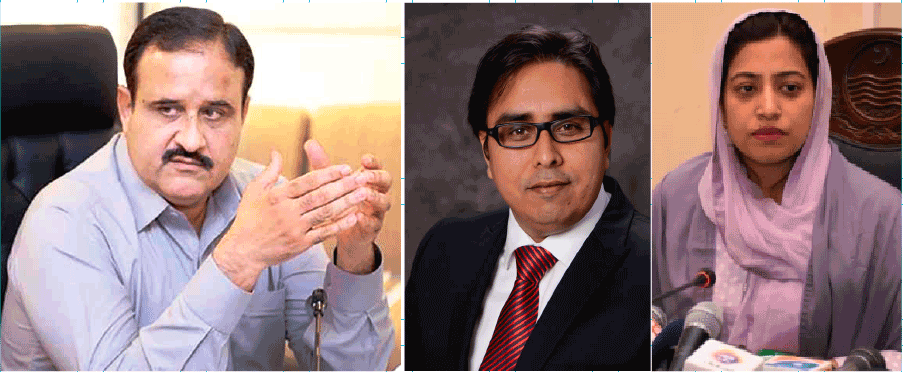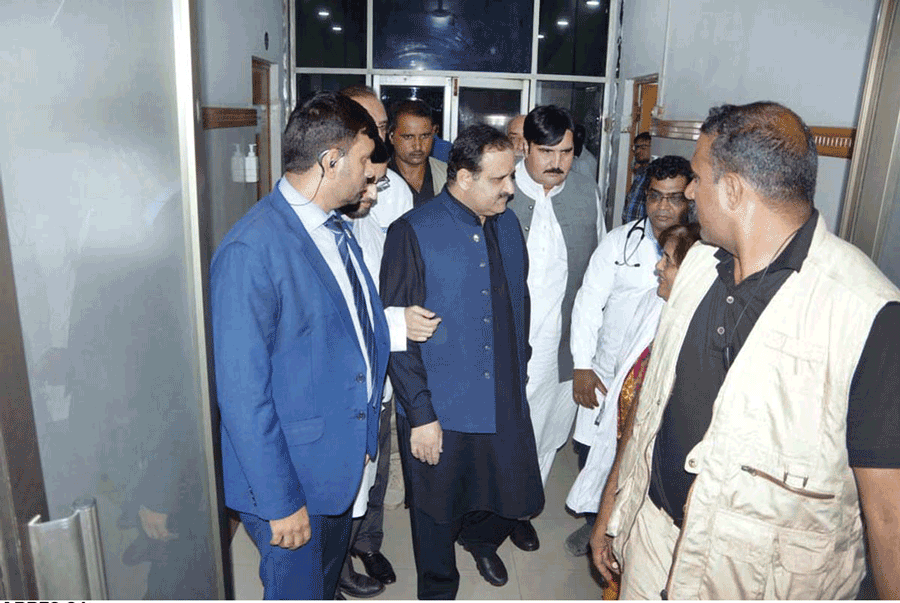Plodding Along
By Adnan Adil | Newsbeat National | Published 6 years ago
Contrary to the circulating rumours that the Chief Minister of Punjab, Usman Buzdar, may be shown the door for his inefficient administration, the recent reshuffle in Punjab is indicative of the fact that Buzdar is gaining strength by the day and consolidating his position in a faction-ridden PTI provincial government.
Speculations in the media about Buzdar’s removal from his post, never seem to die even though Prime Minister Imran Khan, the deciding authority on this particular issue, insists that his and Buzdar’s tenure would end together. While critics in the media believe that Buzdar is a total failure as chief executive of the country’s largest province, with nothing to show for himself during his last one year in office, Imran Khan believes Buzdar will prove to be a success like the legendary fast bowler, Wasim Akram.
Last month, Shahbaz Gill, the vocal and articulate spokesperson of the Punjab chief minister, was shown the door again, fuelling rumours that more reshuffles were expected to take place in the province once Imran Khan returned from Washington, after attending the United Nations’ General Assembly session. Shahbaz Gill, a Pakistani-American with business interests in Chicago, was considered close to Imran Khan and his confidant Naeemul Haq. He would present the PTI’s point of view at solo news conferences and on television shows, but he was seen as projecting himself rather than the media-shy Usman Buzdar, who he was supposed to assist. Buzdar tolerated Gill for almost a year, but eventually told Imran Khan that he was not comfortable with the ambitious Gill poking his nose in every matter, thus undermining his position. Additionally Buzdar showed the door to the deputy commissioner of Lahore, Ms Saleha Saeed, for being tardy in running the surveillance campaign against dengue mosquitoes in the city. For the first time, the message went out that Buzdar could assert his authority.

Reshuffles: Taking a stand, Buzdar shows his spokesperson, Shahbaz Gill and DC Lahore, Saleha Saeed the door.
But the fact remains that Punjab’s chief whip lacks the necessary communication skills, unlike his predecessor Shahbaz Sharif, when it comes to presenting his achievements or defending his administration in front of the Lahori media, that is heavily tilted in favour of the Sharifs and the PML-N. Moreover, the media is unhappy because the Punjab government has drastically cut down the advertisement budget of the government for newspapers and television stations. Sharif, on the other hand, was given to advertising everything his government did, however minor in scope. Buzdar doesn’t.
The campaign against Usman Buzdar also stems from the regional divide between the Punjabi-speaking, industrialised Central Punjab and the Seraiki-speaking, agrarian South Punjab in provincial politics. Belonging to the tribal area of the far-flung Dera Ghazi Khan district of southern Punjab, Buzdar has been a persona non-grata for the influential elite of central Punjab and the powerful Lahore-based media from day one. After 41 long years, someone from South Punjab has assumed charge as the chief executive of the province. Sadiq Hussain Qureshi, from Multan, was the last ruler of the Punjab province from the South until July 1977, when General Zia-ul-Haq imposed martial law. Lahore, the hub of the media and political activities, despises being ruled by Buzdar. They view him as a rank outsider – a tribal chief from the southern district with little connection to the influential middle class and business community of the provincial capital.
The Lahore-based intellectuals and media may not like a tribal chief as the chief executive of the province, but for the PTI it’s a compulsion to have someone from the South at the helm of affairs. In the 2018 elections, the PTI had obtained the most seats from the southern and northwestern districts of Punjab and a few from the central parts including Lahore, Gujranwala and the Faisalabad division. During his election campaign, Imran Khan had pledged to uplift the hitherto ignored, backward Southern Punjab and make it a separate province. As his party lacks the required numbers in parliament for meeting the constitutional requirement of creating a new province, he did the next best thing – he chose a chief executive of Punjab from the South to appease his support base.
Another reason for choosing Buzdar could be the fact that he was a less ambitious and malleable man from a backward area who would not eclipse his boss – a consideration that has always kept the men in Islamabad on tenterhooks. In the 1970s, Zulfikar Ali Bhutto kept changing chief ministers in the Punjab after short durations so that no one could grow to the level where he would challenge his political authority. Punjab’s former chief minister, Mustafa Khar, Hanif Ramay and Meraj Khalid, were not allowed to complete even two years in office. Benazir Bhutto did not allow any powerful political leader to emerge from the Punjab. Nawaz Sharif installed his puppet, Ghulam Haider Wyne, and then his brother, Shahbaz Sharif, as chief minister, ignoring his pledge to Chaudhry Pervez Elahi. Imran Khan, too, desired someone who would take orders from him and not conspire against him.

Viewed as an outsider: Punjab CM, Usman Buzdar.
What has complicated matters for the PTI government in Punjab is the fact that it has a thin majority of only eight members in the house. And that slim majority was made possible by luring all independent elected provincial assembly members to join the PTI. In a house of 371, the PTI at present enjoys a strength of 181 members against 173 members of the opposition – 166 opposition members belong to the PML-N and seven to the Pakistan People’s Party (PPP). There are 10 PML-Q members, while a few others belong to the smaller groups.
Had more than two dozen independents not been inducted into the party thanks to the hectic efforts of Jahangir Khan Tareen, the PTI would not have gained a majority to form the Punjab government. In order to further strengthen its position, the PTI made the PML-Q’s Chaudhry Pervez Elahi the speaker of the provincial assembly and inducted two of its 10 members in the provincial cabinet. If the PML-Q and a few of the ruling PTI MPAs defect to the PML-N, the government of Usman Buzdar could fall.
The composition of the Punjab government and the power dynamics within the PTI require Buzdar to do a balancing act among the opposing groups in his government. Governor Chaudhry Sarwar largely draws support from his Arain biradari, while Speaker Chaudhry Pervez Elahi has his roots in the Jat clan and is keen to see the PTI remain dependent on his six-member squad of the PML-Q. Elahi has joined forces with the powerful Jahangir Tareen, who himself was a candidate for the chief minister’s office before he was disqualified from holding any public office by the Supreme Court of Pakistan.
Still, being a smart operator and generous financier of the party’s activities, he continues to enjoy considerable clout within the party and has the backing of Prime Minister Imran Khan.
Property tycoon Abdul Aleem Khan, another top financier of the PTI and a man with significant organisational capacity, also harboured aspirations of becoming chief minister of the Punjab, but lost his chance when arrested by the National Accountability Bureau in a case of unexplained wealth soon after becoming a cabinet member in the Punjab. He calls the shots with the help of his supporters within the party, who keep running a social media campaign against Buzdar for being an inefficient and ineffective administrator.
Ironically, both Buzdar’s strength and weakness lie in the fact that he has given leeway to PTI Punjab’s notables and accommodated their demands regarding postings, transfers and allocation of development funds, thus giving the impression that he is a weak chief executive prone to pulls and pressures from different sides. At the same time this is what makes him acceptable to the opposing power-brokers.
However, there is no denying the fact that Usman Buzdar is not as efficient and active an administrator as his predecessor Shahbaz Sharif. He does not call any meetings of the provincial bureaucrats early in the morning or make them work till late in evening or ask them to attend office, even on weekends, the way Shahbaz Sharif was prone to do. Nor does he breathe down the necks of his cabinet colleagues to accomplish a task like his predecessor. Consequently, the top government officers have developed a very laid-back attitude and can create embarrassing situations for the PTI government, as has been observed in the case of the dengue outbreak all over the province. Owing to official neglect, the
surveillance surveys and mosquito elimination sprays were not conducted on time, resulting in the spread of dengue.
During his election campaign, Imran Khan had made tall promises of carrying out police and administrative reforms and radically improving governance in the country’s biggest province, but that has not materialised so far. And while the blame for this is laid at the doorstep of Chief Minister Buzdar, his boss Imran Khan must take part of the blame for he is ruling the province through his proxy, in whom he has full trust and confidence.


